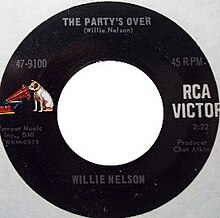
Willie Hugh Nelson is an American singer, songwriter, guitarist, activist, and actor. He was one of the main figures of the progressive and outlaw country subgenres that developed in the late 1960s as a reaction to the conservative restrictions of the Nashville sound. The critical success of his album Shotgun Willie (1973), combined with the critical and commercial success of Red Headed Stranger (1975) and Stardust (1978), made Nelson one of the most recognized artists in country music. Nelson has acted in over 30 films, co-authored several books, and has been involved in activism for the use of biofuels and the legalization of marijuana.
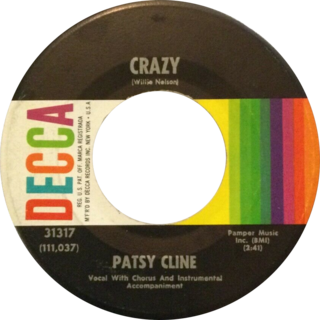
"Crazy" is a song written by Willie Nelson and popularized by country singer Patsy Cline in 1961. Nelson wrote the song while living in Houston, working for Pappy Daily's label D Records. He was also a radio DJ and performed in clubs. Nelson then moved to Nashville, Tennessee, working as a writer for Pamper Music. Through Hank Cochran, the song reached Patsy Cline. After her original recording and release, Cline's version reached number two on Billboard's Hot Country Singles, also crossing to the pop chart as a top 10 single.

Shotgun Willie is the 16th studio album by Willie Nelson, released in 1973. The recording marks a change of style for Nelson, who later stated that the album "cleared his throat". When Nelson refused to sign an early extension of his contract with RCA Records in 1972, the label decided not to release any further recordings. Nelson hired Neil Reshen as his manager, and while Reshen negotiated with RCA, Nelson moved to Austin, Texas, where the ongoing hippie music scene at the Armadillo World Headquarters renewed his musical style. In Nashville, Nelson met producer Jerry Wexler, vice president of Atlantic Records, who was interested in his music. Reshen solved the problems with RCA and signed Nelson with Atlantic Records as their first country music artist.

Yesterday's Wine is the 13th studio album and a concept album by country singer Willie Nelson. Nelson had been recording for RCA Victor since the early 1960s, and had released no significant hit records. By 1970, his recordings had reached mid-chart positions. Nelson lost the money he made from his song-writing royalties by financing concert tours that were generally unsuccessful and unprofitable. In addition to problems with his music career, Nelson had a troubled personal life. He had divorced his wife, Shirley Collie, and his Tennessee ranch had been destroyed by a fire.

The Party's Over and Other Great Willie Nelson Songs is the sixth studio album by country singer Willie Nelson.

Country Willie: His Own Songs is the third studio album by country singer Willie Nelson. This was Nelson's third album, his first for RCA Victor.

...And Then I Wrote is the debut studio album by country singer Willie Nelson, recorded during August and September 1962 and released through Liberty Records.

The Family is Willie Nelson's touring and recording group. Nelson, who did not manage through the 1960s to succeed as a singer, retired after the failure of his 1971 album Yesterday's Wine. The following year, he returned from retirement rejuvenated by the burgeoning music movement of Austin, Texas.

Bobbie Lee Nelson was an American pianist and singer, the elder sister of Willie Nelson, and a member of his band, Willie Nelson and Family. When she was five, her grandmother taught her to play keyboards with a pump organ, and after successful appearances at gospel conventions held in Hillsboro, Texas, her grandfather bought her a piano.

"Night Life" is a song written by country music singer-songwriter Willie Nelson. Nelson was inspired to write the song during one of his trips from his home in Pasadena, Texas, to his work, singing at the Esquire Ballroom in Houston.

"Bloody Mary Morning" is a song written and recorded by American country music singer Willie Nelson. Nelson wrote the song inspired by his struggles to become a "better parent". It was originally released in the 1970 RCA Records release Both Sides Now with the title "Bloody Merry Morning".
The Western Express was a country-music radio show transmitted by KCNC in Fort Worth, Texas. The show started in 1947, hosted by disk jockey Charlie Williams. In 1956, the station later hired Willie Nelson, then a struggling singer-songwriter who previously worked on different radio stations. Nelson hosted the three-hour-long show singing his original songs, taking calls and playing records.
Neon Boots Dancehall & Saloon is a Country and Western bar/honky tonk that was founded as the Esquire Ballroom in 1955 by Raymond Proske in Houston, Texas, at 11410 Hempstead northwest of downtown Houston. In the 1970s and 1980s the club was considered the main rival to Gilley's Club across town in Pasadena.
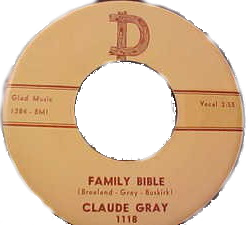
"Family Bible" is a song written by country music singer-songwriter Willie Nelson. Nelson began writing the song in 1957, while he enjoyed success as a disc jockey in KVAN, in Vancouver, Washington. After being denied a raise by the station, he moved to Houston, Texas. Due to financial issues he sold the song to Paul Buskirk.

"Mr. Record Man" is a song written by country music singer-songwriter Willie Nelson. After writing the song, Nelson moved to Houston, Texas, where due to his financial issues, tried to sell it to Larry Butler. Butler, who rejected to buy the song, employed Nelson instead. After his original songs turned into hits for other artists, Nelson was signed as a recording artist by Liberty Records.
"The Storm Has Just Begun" is a song by country music singer-songwriter Willie Nelson. Nelson wrote the song at the age of twelve. While working for KBOP in Pleasanton, Texas, in 1955, the song was one of the first two ever recorded by Nelson.

"Willingly" is a duet by American country music singer Willie Nelson and Shirley Collie, produced by Joe Allison during Nelson's third session for Liberty Records. Released in March 1962, the album reached number ten on Billboard's Hot Country Singles.
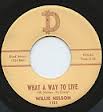
"What a Way to Live" is a song written by country music singer Willie Nelson. He recorded the song on his second session with D Records, after moving to Houston, Texas. Produced by Bill Quinn, it was cut at Gold Star Studios in March 1960.
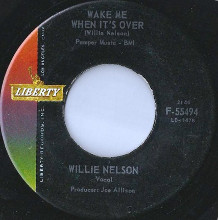
"Wake Me When It's Over" is a song written and recorded by American country music singer Willie Nelson. After being signed as a recording artist to Liberty Records in 1961, the song was recorded during his second session with the label in September 1961 at Radio Recorders. Selected as the A-side of one of the promotional singles, the song failed to chart.
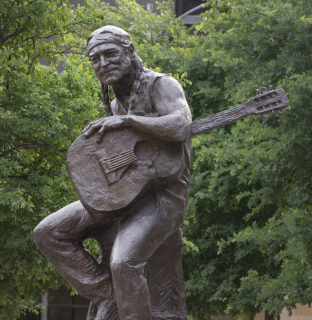
The Willie Nelson statue, or simply Willie, is a bronze sculpture of singer-songwriter Willie Nelson, located in Downtown Austin, Texas. The statue was commissioned to artist Clete Shields by the nonprofit organization Capital Area Statues.
